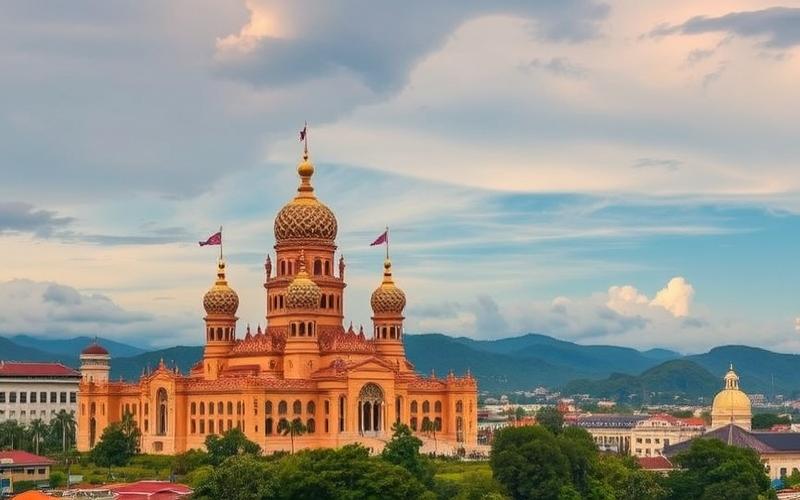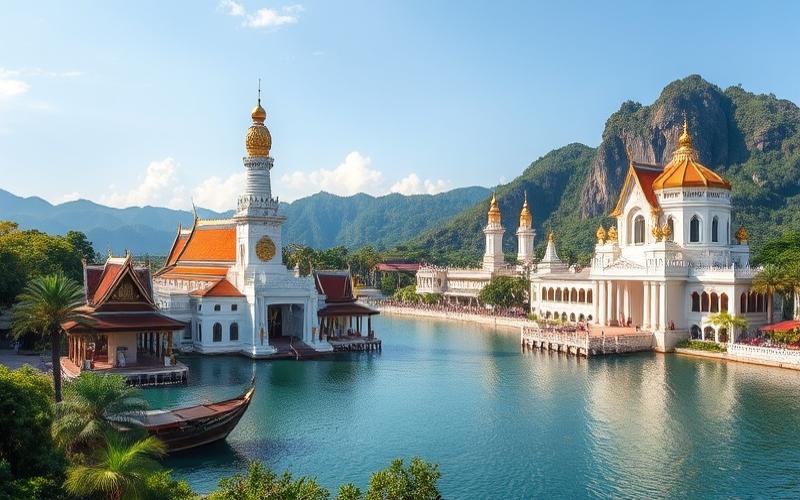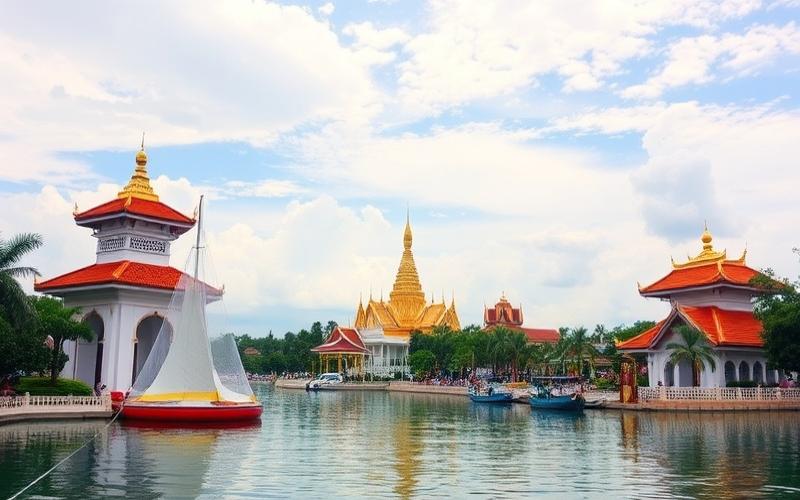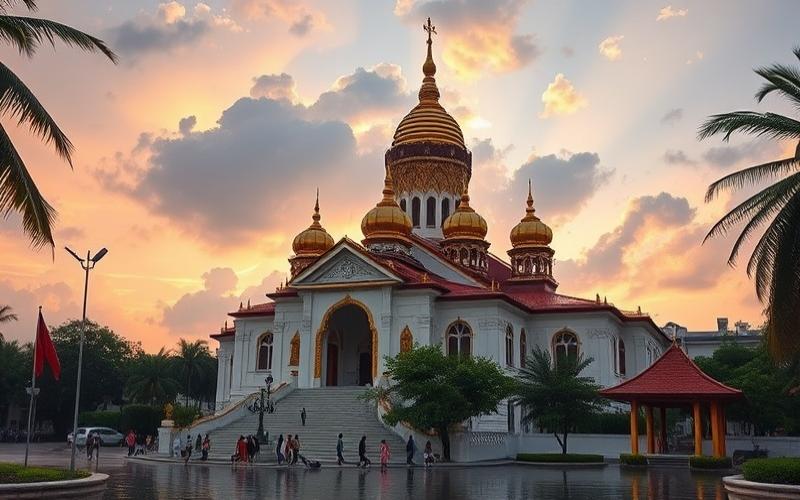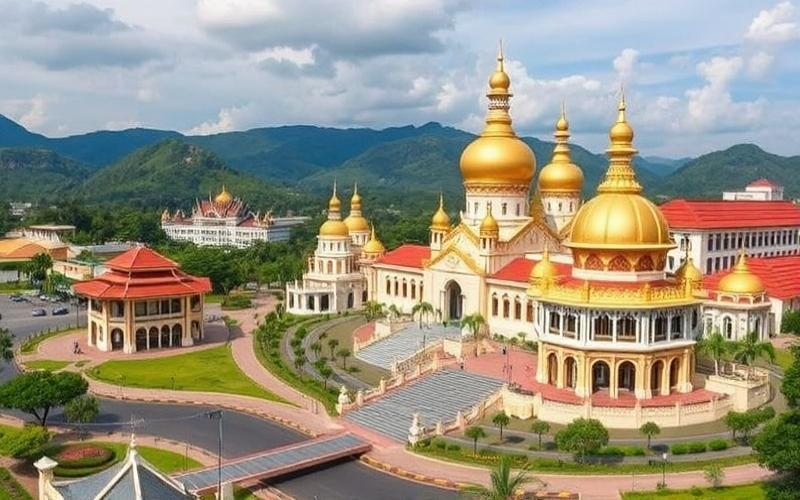
 Published on and written by Cyril Jarnias
Published on and written by Cyril Jarnias
Brunei, a small sultanate located on the island of Borneo, is a country rich in natural resources with a stable economy. Although less known than its Asian neighbors, Brunei’s real estate market offers interesting opportunities for foreign investors. However, before embarking on this venture, it’s crucial to understand the specific legal and regulatory frameworks governing property acquisition and management in this country. This article will guide you through the essential aspects of Brunei’s real estate legal framework, enabling you to make informed decisions for your potential investments.
Property Access for Foreigners: An Open Market with Restrictions
Contrary to some common misconceptions, Brunei allows foreigners to acquire real estate properties within its territory. However, this openness comes with certain restrictions that are important to understand before starting an investment project.
The right to acquire real estate property in Brunei is granted to foreigners, but it’s subject to specific conditions. The main restriction concerns the type of property accessible to non-nationals. Foreigners are permitted to purchase apartments and condominiums, but acquiring land or individual houses is generally prohibited.
This policy aims to preserve the national land heritage while allowing some openness to foreign investments. It’s part of a broader strategy for economic development and diversification of the country’s revenue sources, traditionally dependent on its oil and gas resources.
For foreign investors interested in the Bruneian real estate market, it’s crucial to focus on condominium properties. These properties, often located in developing urban areas, offer interesting opportunities for both rental investment and personal use.
Good to know:
Foreigners can buy apartments and condominiums in Brunei, but not land or individual houses. This restriction aims to protect the national land heritage while encouraging foreign investments in the real estate sector.
Brunei’s Real Estate Legal Framework: An Evolving System
The legal framework governing real estate in Brunei is a blend of customary law, Islamic law (Sharia), and modern legislation. This unique combination reflects the country’s history and culture while adapting to the requirements of a developing economy.
The main law governing real estate transactions in Brunei is the Land Code (Cap. 40). This law establishes fundamental rules regarding land ownership, property transfers, and owner rights. It also defines the different types of property titles existing in Brunei, including long-term leases that are often used for properties accessible to foreigners.
Complementing the Land Code, other important legislative texts regulate the real estate sector:
- The Land Acquisition Act (Cap. 41), which governs land acquisition procedures by the State
- The Land Surveyors Act (Cap. 100), which regulates the activities of surveyors
- The Town and Country Planning Act (Cap. 143), which defines urban planning and territorial planning rules
These laws form a comprehensive regulatory framework aimed at ensuring transparency and security in real estate transactions. They notably provide strict procedures for property registration and title transfers, as well as dispute resolution mechanisms.
It’s important to note that Brunei’s legal system is constantly evolving. The government is working to modernize and simplify real estate-related procedures, with the aim of attracting more foreign investments. These efforts translate into regular reforms of the regulatory framework, aiming to make it more accessible and understandable for international investors.
Good to know:
Brunei’s real estate legal framework is based on the Land Code, supplemented by other specific laws. This system is constantly evolving to adapt to the needs of a modern economy and attract foreign investors.
Real Estate Taxation in Brunei: An Attractive Regime for Investors
Real estate taxation in Brunei is generally considered attractive for investors, both local and foreign. The country has established a relatively simple and advantageous tax system, aiming to encourage investments in the real estate sector.
One of the most remarkable aspects of Bruneian taxation is the absence of income tax for individuals. This policy also applies to rental income, making real estate investment particularly interesting for those seeking to generate passive income.
However, there are other taxes and fees to consider when acquiring and holding real estate property in Brunei:
- Stamp duties: They apply when purchasing a property. The rate varies depending on the property value, but is generally between 1% and 3% of the purchase price.
- Property tax: It’s payable annually by real estate property owners. The rate is relatively low, generally around 0.5% of the estimated property value.
- Condominium fees: For apartments and condominiums, monthly fees are generally due for common area maintenance and shared services.
It’s important to note that Brunei does not apply capital gains tax on real estate. This means that profits made from selling a property are not subject to tax, which can represent a significant advantage for investors aiming for long-term appreciation strategies.
Despite these tax advantages, it’s crucial for foreign investors to fully understand their tax obligations, both in Brunei and in their home country. Indeed, even if Brunei doesn’t tax certain income or gains, the investor’s country of residence might tax them.
Good to know:
Brunei offers an advantageous tax regime for real estate, with no income tax and no capital gains tax. However, stamp duties and property tax apply. It’s essential to also consider tax implications in your home country.
Owner Rights and Responsibilities: A Balance to Understand
In Brunei, real estate owner rights and responsibilities are defined by a set of laws and regulations that aim to ensure a balance between protecting owner interests and those of tenants or the community in general.
Owners in Brunei enjoy significant rights over their properties. They have the right to use, rent, sell, or transfer their property according to their will, within the limits set by law. For condominium properties, these rights are exercised while respecting condominium rules and other owners.
Regarding rentals, owners have the right to freely set rental amounts and conditions, subject to respecting certain legal standards. They can also terminate a lease under the conditions provided by the contract and law.
However, these rights come with important responsibilities:
- Property maintenance: Owners are required to maintain their property in good condition, in accordance with current safety and health standards.
- Regulatory compliance: They must comply with local laws and regulations, particularly regarding urban planning and environment.
- Tax payments: Owners are responsible for paying property tax and other charges related to their property.
- Obligations towards tenants: In case of rental, owners must respect tenant rights as defined by law and the lease agreement.
It’s important to note that Brunei places great importance on respecting private property. The country’s laws offer strong protection against arbitrary expropriation, although the State retains the right to acquire land for public interest projects, with fair compensation.
For foreign owners, it’s crucial to fully understand these rights and responsibilities, which may differ from those in their home country. It’s recommended to consult a local lawyer specialized in real estate law to ensure compliance with all legal obligations and effectively protect one’s rights.
Good to know:
Owners in Brunei benefit from significant rights over their properties, but must also respect important responsibilities regarding maintenance, regulatory compliance, and tenant rights. Private property is well protected, but it’s essential to understand the local legal framework well.
Regulatory Developments: Towards Modernization of the Real Estate Sector
Brunei’s real estate sector is undergoing a period of transformation, marked by regulatory developments aimed at modernizing and energizing the market. These changes reflect the government’s willingness to diversify the country’s economy and attract more foreign investments in the real estate sector.
One of the most significant developments concerns the simplification of real estate acquisition procedures for foreigners. The government has undertaken efforts to streamline the approval process for property purchases by non-nationals, thereby reducing delays and administrative complexity. This approach aims to make the Bruneian real estate market more attractive and competitive on a regional scale.
Furthermore, Brunei has recently implemented initiatives to encourage sustainable development in the real estate sector. New regulations have been introduced to promote the construction of green buildings and the adoption of environmentally friendly real estate practices. These measures are part of the national sustainable development strategy and could influence future investment opportunities in the country.
The government is also working on modernizing the property title registration system. A project to digitize land registries is underway, aiming to improve transparency and efficiency in real estate transactions. This initiative should facilitate title searches and reduce risks associated with real estate transactions.
Additionally, discussions are ongoing to potentially expand the types of properties accessible to foreign investors. Although nothing has been decided yet, these discussions demonstrate the government’s willingness to further open the real estate market to international capital.
It’s important for investors to stay informed about these regulatory developments, as they can significantly impact investment opportunities and procedures to follow. Changes in regulations can open new possibilities, but may also introduce new requirements or restrictions.
Good to know:
Brunei is committed to modernizing its real estate sector, with reforms aimed at simplifying procedures for foreigners, promoting sustainable development, and improving transaction transparency. These developments could create new opportunities for international investors.
Conclusion: Brunei, A Real Estate Market in Transformation
Brunei’s real estate market offers interesting prospects for foreign investors, despite certain restrictions. The legal and regulatory framework, although still evolving, provides a solid foundation for real estate transactions. The advantageous taxation, combined with the country’s economic stability, makes Brunei attractive for those looking to diversify their real estate portfolio in Southeast Asia.
However, as with any foreign investment, it’s crucial to fully understand local specificities and stay informed about regulatory changes. Potential investors must consider not only the opportunities offered by the Bruneian market, but also the challenges associated with investing in a country whose culture and legal system may differ significantly from those of their home country.
Brunei positions itself as a promising emerging market in Southeast Asia’s real estate landscape. With its modernization efforts and openness to foreign investments, the country could well become a destination of choice for international real estate investors in the coming years.
Disclaimer: The information provided on this website is for informational purposes only and does not constitute financial, legal, or professional advice. We encourage you to consult qualified experts before making any investment, real estate, or expatriation decisions. Although we strive to maintain up-to-date and accurate information, we do not guarantee the completeness, accuracy, or timeliness of the proposed content. As investment and expatriation involve risks, we disclaim any liability for potential losses or damages arising from the use of this site. Your use of this site confirms your acceptance of these terms and your understanding of the associated risks.




